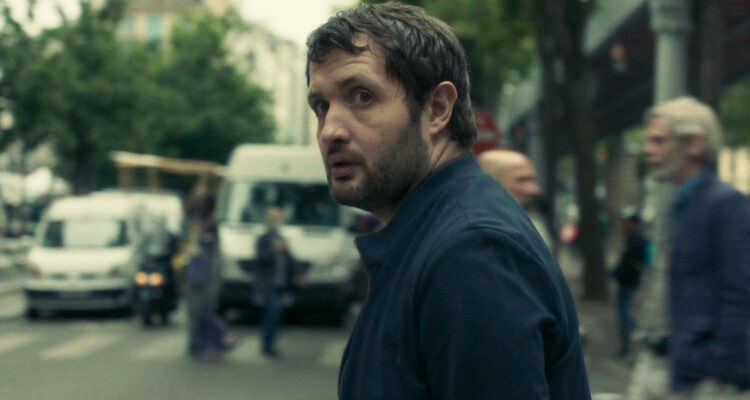If you closely follow the zodiac, you already know we’re in the second Mercury retrograde of the year. If the planets aren’t your thing, maybe you turn to tarot cards when hoping to divine some clarity around the events of your life. Or perhaps you put your faith in the advice parsed out by Caleb Weatherbee in the annual “Farmers’ Almanac.” But what if you could obtain guidance from someone with a direct connection to the fabric of the universe? That’s the promise offered by Ramses (Karim Leklou), a clairvoyant who offers his clients — for a handsome fee — the opportunity to receive messages and warnings from their loved ones who have passed on. There’s likely no other pandit or sage in the 18th arrondissement who can hold their customers in thrall like Ramses. Does it matter that he doesn’t believe a word he’s saying?
READ MORE: Cannes Film Festival 2022 Preview: 25 Must-See Films To Watch
Signs and wonders are the cornerstones of Clement Cogitore’s unassuming and quietly surprising “Sons of Ramses” (“Goutte d’Or”). Yet, for Ramses, faith is nothing more than getting someone to believe in an elaborate parlor trick. Operating his services as a medium out of his apartment, he sees his admittedly impressive work — he gives a committed performance to his customers that would be award-winning in any other context — as a harmless con, one that lets people get through their grief while putting rent money in his pocket. For his clients, not even his disheveled appearance in jeans and a t-shirt can take away their belief in his uncanny power to contact their loved ones in the afterlife. Little do they know that his small crew of co-conspirators — coupled with some social media snooping, intuitive guesswork, and an earpiece to feed him critical details — makes his prestidigitation utterly convincing.
This reputation becomes his undoing when a gang of undocumented kids from Tangier, who have been quietly terrorizing the neighborhood, come to him with an order to find their friend who has gone missing. Why Ramses? Even they have been led to believe that he’s “the best” at what he does, demanding that he use his powers as a “mage” to find their friend. Naturally, their status and numerous run-ins with the law mean they can’t go to the police. The only clue to the kid’s whereabouts is his last message: a selfie taken while lying down on a pile of money.
Surrounded by the gang he once saw mugging a woman in broad daylight, Ramses isn’t in a position to say no. And as Ramses peers at the selfie, he quickly realizes it’s the same kid who stole the necklace from around his neck at knifepoint just a few days earlier — a talisman to ward off evil given to him by his father. What happens next can only be described as a miracle that leads him to the child’s body at a construction site and shakes Ramses’ view of the world to its foundation.
Set amongst the vibrant atmosphere of La Goutte d’Or, Cogitore doesn’t just introduce us to a mystic hustler but to a network of palm readers and fortune-tellers, each representing a different community that has settled into the neighborhood. Cinematographer Sylvain Verdat works with an immediacy that would make the Dardennes smile, dipping us into shops, police stations, parking lots, and down sidewalks and alleys with an imperceptible intimacy that soon makes the patchwork of the neighborhood feel familiar. Cogitore and Verdat stick close by Ramses as he navigates the streets he’s been turning his back on ever since he took over the business his father started. Having ignored the unspoken territory agreements established with other spiritualists, Ramses forged his own contentious and lonesome path where it’s every man and every dollar earned for himself. Now, thrust into an alliance with the outcasts from Tangiers, Ramses takes a new view of the network of people that keep La Goutte d’Or thriving and of the ones who are slipping through the cracks.
Centering the film is Karim Leklou (“The World Is Yours,” “The Stronghold,” “Playground”), one of the most exciting actors in French cinema working right now. On-screen for almost every moment, he carries the rumpled and edgy Ramses with a face that’s weary, vulnerable, and marked with the hard-earned wisdom after years of eking out his place. “Sons of Ramses” follows a man learning to let his guard down, and Leklou plays it invisibly, much in the same way that you don’t truly see a flower until it’s fully bloomed. His performance is tender, tough, and fascinating to watch unfold.
As we roll out of the pandemic and find ourselves back in the world, the work of restringing the connections in our immediate communities will begin anew. The guy who cuts your keys; the woman running the flower shop who always stops to chat; the bartender who will slip you the occasional beer at no charge. Ramses begins to realize that for all his spiritual forgery, he can’t begin to understand himself until he makes a real connection to the people closest around him. Cogitore cannily uses his film’s supernatural and criminal elements as cover to sneak in a potent portrait of a community. “Sons of Ramses” is a compassionate and compelling plea, needed now more than ever, about the empathy that must be afforded to the underseen and underrepresented who aren’t so much struggling to be heard as understood. As Ramses discovers, this process can be humbling, but when he relaxes enough to even just perceive below the surface of the boys from Tangier, he sees himself in them, too, kicking off the start of a transformation. [B+]
Follow along with all our coverage from the 2022 Cannes Film Festival.

